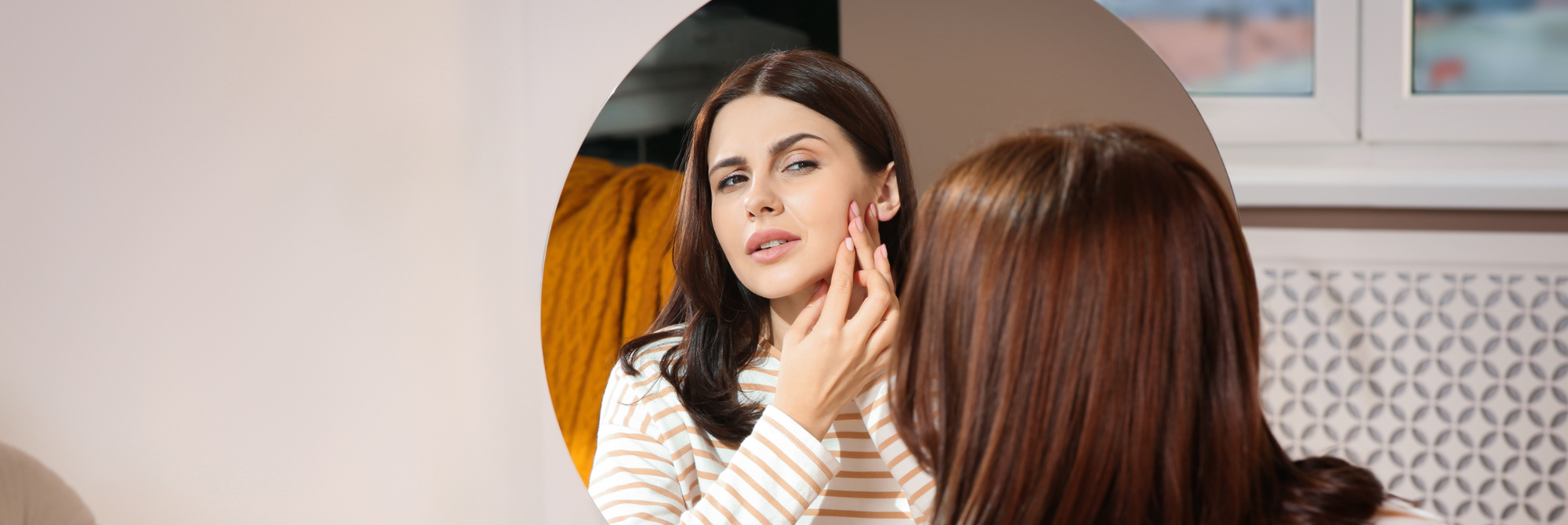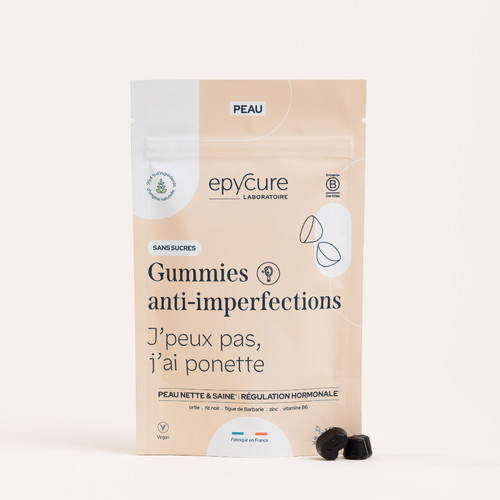Although it's associated with adolescence, acne is no longer just a bad memory for some. According to the French National Authority for Health, approximately 15% of adults over the age of 25 are prone to hormonal acne , with the vast majority of women affected.
Hormonal acne: what is it?
Acne, generally speaking, is due to a disruption of the sebaceous glands , which produce sebum. Sebum is a fat that forms a protective film on the skin of the face. When it is disrupted, its secretion increases, the pores become clogged and reveal imperfections and skin inflammations (spots, comedones, microcysts, nodules, etc.) on the lower part of the face : chin, cheeks, neck and upper back.
Contrary to popular belief, hormonal acne doesn't only affect oily skin: all skin types can be affected . Mainly linked to hormonal imbalance, many other factors must be taken into account: genetics, stress, diet, pollution, tobacco, etc. Treatment becomes more complex due to its multifactorial nature.
Acne triggers
Hormonal acne generally appears in adolescence, with puberty and the arrival of menstruation , but it can persist in some people. Spoiler alert! Periods do not disappear after the age of 25; throughout life, hormonal fluctuations occur - pregnancy, breastfeeding, menopause, not to mention menstrual cycles - These fluctuations are one of the main reasons for the occurrence of hormonal acne . Among other things, this is why adult women are more affected than adult men.
Puberty
During adolescence, “new” hormones appear, notably estrogen in girls and testosterone in boys. It is this hormonal upheaval that causes the first signs of acne to appear.
The rules
Some women easily manage to track their menstrual cycle thanks to the appearance of small pimples. Indeed, a menstrual cycle is like a large wave of hormones that follow one another, three of them are involved: estrogen, progesterone and testosterone. Estrogens are secreted before ovulation, they have a positive effect on the skin while progesterone and testosterone, which can also be called androgen hormones, are mainly produced before, during and after menstruation. They are the ones that will have a negative impact on the skin, it is at this time that we can see small pimples appear.
Pregnancy
Here, it's a bit of an all-or-nothing situation; for some, the hormonal imbalance makes their skin smooth and radiant - this is what we call the pregnancy "glow" - while others won't be so lucky. Pregnancy is a major hormonal upheaval , with estrogen and progesterone being more stimulated, and even others being specifically expressed, such as the hormone HCG or oxytocin.
Menopause
Around the age of 50, the secretion of female hormones will decrease to leave more room for testosterone, which will promote the appearance of oilier skin and therefore possible imperfections .
PCOS
PCOS, or polycystic ovary syndrome, is one of the most common hormonal disorders . In addition to its general impact on health, including infertility, PCOS is characterized by an overproduction of androgens that leads to skin imperfections all over the body, particularly on the lower parts of the face.
3 tips to prevent hormonal acne
Avoid touching your spots
We've all heard the saying, "If you touch it, 10 will grow next to it," or "We didn't even see it," but despite everything, the urge is too strong. In fact, touching your spots often makes the situation worse because by touching them, you leave the door open to bacteria and increase the risk of infections and therefore, scarring.
Do a double cleanse
This step is crucial for removing impurities that may have accumulated on the skin during the day. Adopting double cleansing with natural and gentle products allows you to restore skin balance without damaging it. You can start with an oil-based makeup remover (no, it doesn't make the skin more greasy!) and finish with a gentle cleanser suited to your skin type .
Taking care of your skin every day
Using the right moisturizers, serums , and lotions helps your skin breathe without clogging pores . Applying sunscreen daily will also help protect you from breakouts and prevent scars from turning brown.
How to get rid of hormonal acne?
It's often said, "Prevention is better than cure," but it doesn't always work for everyone! Fortunately, there are several solutions to try to overcome this problem. We'll explain everything.
Food
“Everything goes through food”
Acne-induced inflammation can be exacerbated by the consumption of fast-acting sugars and milk due to their effect on insulin production and numerous deficiencies. Favoring an anti-inflammatory diet contributes to gut-skin balance. Here are some anti-inflammatory and anti-acne foods:
-
Choose fish and white meat over red meat
-
Eat seasonal fruits and vegetables
-
Foods rich in vitamin A (retinoids): carrots, sweet potatoes, red peppers, etc.
-
Favor plant-based milk (almond, hazelnut, oat, etc.) over animal milk
-
Choose whole wheat starches
-
Foods rich in omega 3 : walnuts, flax seeds, chia seeds, etc.
-
Foods rich in zinc : seafood, eggs, basil, shiitake
Plants that fight acne
Nettle
Rich in trace elements and minerals, nettle is renowned in medicine, particularly for its benefits on the skin where it acts on hyperseborrhea and inflammation .
It is thanks to its leaves that its action on the treatment of acne is effective. It is possible to consume it in the form of an infusion, in powder or in food supplements (in our anti-imperfection Gummies for example 😉) and without contraindications!
The prickly pear
When there is excess sebum, certain bacteria can proliferate and accentuate the appearance of spots, it is on these bacteria that the prickly pear acts. Thanks to its antibacterial action , it acts very effectively against the bacteria responsible for acne. You can also find it in synergy with black rice in our anti-imperfection Gummies to effectively treat your acne!
Essential oils
They are widely used in aromatherapy for their anti-infectious and anti-inflammatory properties . In the treatment of acne, we find tea tree and officinal lavender, acting on inflammation and healing , they reduce the number of comedones and redness linked to acne. Others are known for their astringent and sebum-regulating properties such as lemon and clary sage essential oil.
Essential oils should, however, be used with caution due to their high toxicity. In fact, allergic reactions are very common, including cases of photosensitivity. Before using them, it is essential to be aware of the many contraindications for each.
Sage
Used for centuries, it is used as both a food and a medicine. Thanks to its leaves with multiple virtues , it is particularly popular for its estrogenic action, that is to say, stimulating the production of estrogen. It therefore plays a role in the treatment of acne by rebalancing hormones .
In infusions or powder, sage can be consumed daily except for pregnant and breastfeeding women and for hormone-dependent cancers, in which its use is contraindicated.
Brewer's yeast
We hear a lot about it in the sports world for its interesting protein intake or for hair growth , but not only that! In fact, it is used as a treatment against intestinal imbalances but is also a good candidate as an adjunct treatment against acne , and this, without contraindications.
At Epycure, we are committed to offering treatments that meet the needs of all our customers, especially those suffering from hormonal acne. Our anti-blemish gummies have been specially developed to regulate hormones , as well as sebum production in order to reduce inflammation and promote good healing by combining prickly pear, black rice and nettle for a synergy that is incredibly effective against blemishes .
The pill: a false good idea
Very often prescribed for teenage girls suffering from acne, the pill is not only a hormonal contraceptive . There are different types of oral contraceptives: the estrogen-progestin pill, combined and progestin for different actions:
-
Combined and estrogen-progestin pills reduce the production of androgen hormones , which then reduces acne.
-
The progestin-only pill will promote acne by increasing the level of androgens , prescribed less frequently for women with contraindications to estrogen.
Hormonal acne treatment may seem superficially appealing , but it doesn't treat acne; it only masks it . Once you stop taking the pill, acne is very likely to reappear.
Drugs
In cases of severe acne , medical treatments may be prescribed by your general practitioner or dermatologist. These medications are designed to treat acne in depth but are very often accompanied by side effects .
Roaccutane
The most famous.
It is a powerful anti-acne medication in tablet form (for internal action) or gel form that will act directly on the skin from the outside. Composed mainly of isotretinoin, its action is based on the regulation of sebum production . Isotretinoin is, as its name suggests, a retinoid that acts on the evacuation of sebum to limit the obstruction of pores and the deposit of certain bacteria responsible for inflammation .
Skinoren
In cream form, this antiseptic works directly to destroy germs linked to pimple inflammation thanks to its main active ingredient, azelaic acid. With its antibacterial action, it helps reduce the number of bacteria and fats on the skin's surface to limit infections.
Unfortunately, they come with many contraindications , precautions for use and side effects, not to mention that it is not suitable for everyone, because it will have no effect on some people.
Lack of self-confidence , fear of what others think , getting rid of acne can sometimes be a real obstacle course , giving rise to many insecurities. By adopting a routine and products adapted to acne, you can put all the chances on your side to get rid of it once and for all!



